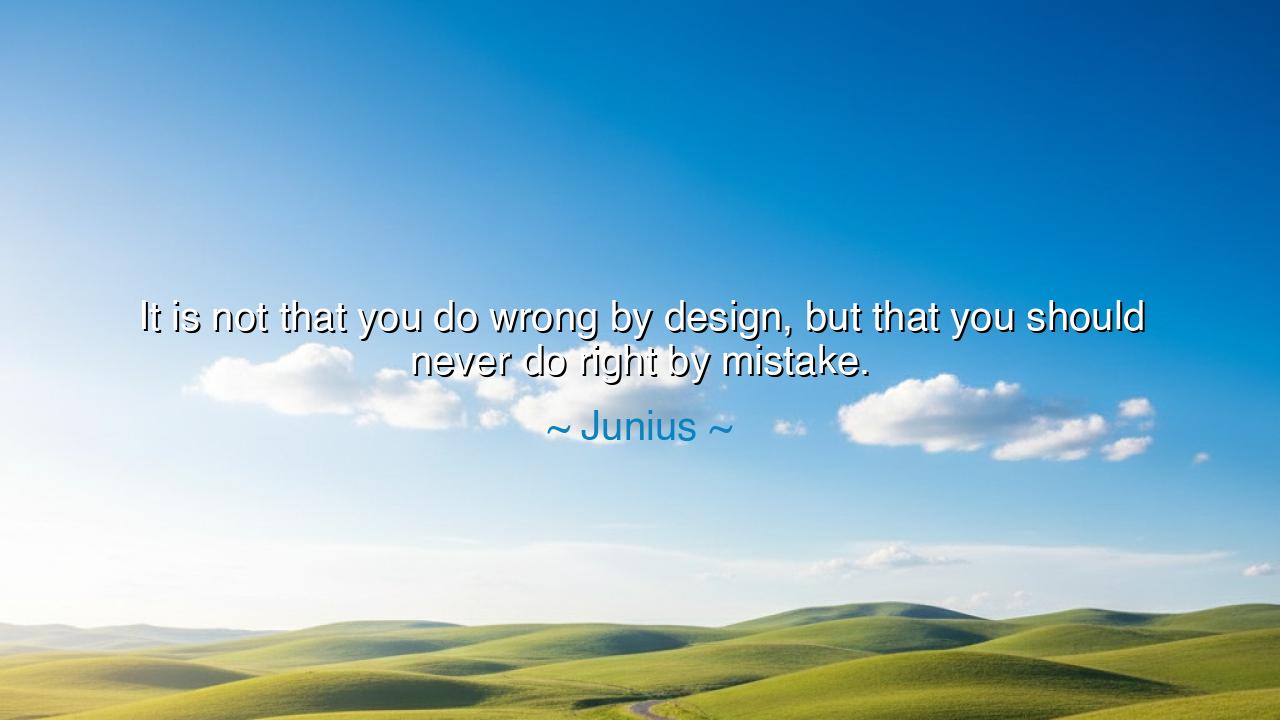
It is not that you do wrong by design, but that you should never






“It is not that you do wrong by design, but that you should never do right by mistake.” – Junius
Listen well, O seekers of virtue and guardians of conscience, to the sharp wisdom of Junius, the mysterious voice who thundered through the political life of eighteenth-century England. The author, whose true name was never known, wrote fiercely to expose corruption and hypocrisy in the halls of power. His words, cloaked in anonymity but aflame with conviction, burned falsehood wherever it hid. In this saying—“It is not that you do wrong by design, but that you should never do right by mistake”—he speaks of the sacred bond between intention and morality, between the heart that acts and the deed that follows.
For what is virtue, if it comes only by accident? A man who does good without knowing why, who happens upon righteousness by chance, is like a traveler who stumbles into a temple while seeking shelter from the rain. His steps may lead him into holiness, but his soul remains unawakened. True goodness must be chosen, not merely done. The act is not enough; the will behind it must be pure and deliberate. Junius reminds us that righteousness without intention is empty, just as wrong done without malice may still wound the world.
Consider, O listener, the ancient tale of Marcus Brutus, the Roman who slew his friend Julius Caesar. To some, Brutus did wrong by design, betraying his friend in cold ambition. Yet to others, he acted out of principle, believing he saved the Republic from tyranny. Whether one calls him villain or hero, his act was deliberate, thought out, and aligned with his sense of duty. Compare this to the man who does right by accident—who rescues another not from compassion but from convenience, or who speaks truth only when it profits him. The world may praise both, but the gods—and the conscience—know the difference. Motive is the measure of virtue.
Junius’s warning strikes against the weakness of a careless heart. When he says, “You should never do right by mistake,” he teaches that virtue without awareness is fragile, like a leaf carried by the wind. The one who acts rightly by chance cannot be trusted to do so again, for his compass is not fixed. He may err the next time, swayed by ease or ignorance. But the one who acts from principle, who knows why he does what he does, stands firm even when the storm rises. To live rightly, then, is to live with intention—to see, to judge, to choose.
In this, Junius echoes the wisdom of Aristotle, who said that virtue is a habit formed through deliberate action, guided by reason. No man becomes just by accident, nor brave by impulse. These qualities are forged, again and again, through awareness and discipline. The soldier who throws himself into battle out of rage may die bravely, but his courage is blind. The one who fights with clear purpose—knowing both fear and duty—possesses the true courage of the soul. So too in life: good intentions must illuminate good deeds, else they are hollow gestures cast into darkness.
And yet, there is mercy in Junius’s words. For he does not say, “Do not err.” He acknowledges that to do wrong by design is not always the great sin—it is to act without conscience that destroys the moral spirit. Mistakes are part of the human story; ignorance may cloud the mind. But to walk without reflection, to act without reason, is to live like a shadow without shape. Every person must strive, then, to make each act a conscious reflection of belief, each decision a mirror of the soul’s highest truth.
So, O child of the present age, take heed of this ancient wisdom: Do not let your goodness be accidental. Live with awareness of why you act, and let your choices spring from principle, not from habit or chance. When you give, give from compassion; when you stand firm, do so from conviction. For the world has enough deeds without meaning—what it needs are hearts that understand the meaning of their deeds.
And thus, as Junius teaches, integrity lies not in perfection, but in intention. To do right knowingly is to walk the path of wisdom; to do right by mistake is to drift in ignorance. Let your will be your guide, your conscience your compass. For in a world of confusion, where good and evil often wear the same face, only those who act with understanding can truly claim the name of the righteous.






AAdministratorAdministrator
Welcome, honored guests. Please leave a comment, we will respond soon